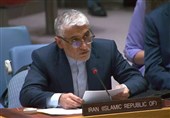UN Estimates $200mln Needed for Rohingya Refugees in Bangladesh for 6 Months
TEHRAN (Tasnim) - The United Nations estimates that $200 million will be needed over the next six months to help Rohingya Muslims refugees who have fled to Bangladesh from Myanmar in "massive numbers" to escape a bloody military campaign.
Bangladesh and humanitarian organizations are struggling to help 422,000 Rohingya who have arrived since Aug. 25, when attacks by Rohingya militants triggered a Myanmar counter-insurgency offensive that the United Nations has branded ethnic cleansing.
Bangladesh was already home to some 400,000 Rohingya who fled earlier bouts of violence and persecution in Buddhist-majority Myanmar, Reuters reported.
The United Nations launched an appeal for $78 million on Sept. 9, but the refugees have kept coming.
"Right now, we’re looking at $200 million," Robert D. Watkins, UN resident coordinator in Bangladesh told Reuters in an interview in his office in the capital, Dhaka, on Friday.
"It has not been confirmed, but it is a ballpark figure based on the estimates on the information we have," he said, adding that would be for six months.
"We base these appeals on immediate needs, and right now we know they’re going to be here for six months."
Myanmar rejects accusations of ethnic cleansing, saying its security forces are fighting insurgents of the Arakan Rohingya Salvation Army who claimed responsibility for attacks on about 30 police posts and army camp on Aug. 25.
The insurgents were also behind similar but smaller attacks in October last year, that also led to a brutal Myanmar army response triggering the flight of 87,000 Rohingya to Bangladesh.
Watkins said the exodus since Aug. 25 was much bigger than the flows sparked by ethnic cleansing in the former Yugoslavia during the 1990s.
"It’s different from that here because the numbers are so much bigger ... massive numbers in such a short period of time," he said.
The monsoon rains have compounded the problems for the aid agencies, turning roads into quagmires. Watkins said the United Nations was working with Bangladeshi authorities to build new roads.
He said the situation had not stabilized in terms of new arrivals so it was difficult to say for how many people they were planning for, or for how long.
"We don’t want to plan a 10-year operation, obviously, because we want to maintain hope that there will be a way for negotiating a return of the population," he said.
"We can’t plan too far in the future because it becomes a self-fulfilling prophecy. On the one hand, politically, it sends a strong signal, which we don’t want to send, which is that people are going to be here for a long time.
"And our donors are not prepared to respond to anything beyond a one-year time frame given the massive amounts of money we are asking for.”
The Rohingya are regarded as illegal immigrants in Myanmar and most are stateless.
Myanmar leader Aung San Suu Kyi said this week Myanmar was ready to start a process agreed with Bangladesh in 1993 under which anyone verified as a refugee would be accepted back "without any problem".
But many Rohingya are pessimistic about their chances of ever going home, partly because many do not have official papers confirming their residency.






